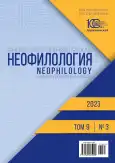The works of V.M. Shukshin in China: history of translations and creativity reception
- Authors: Shao S.1
-
Affiliations:
- Peoples’ Friendship University of Russia named after Patrice Lumumba
- Issue: Vol 9, No 3 (2023)
- Pages: 583-595
- Section: RUSSIAN LITERATURE AND LITERATURE OF PEOPLES OF RUSSIAN FEDERATION
- URL: https://journal-vniispk.ru/2587-6953/article/view/295733
- DOI: https://doi.org/10.20310/2587-6953-2023-9-3-583-595
- ID: 295733
Cite item
Full Text
Abstract
We consider the history of translations and publications of V.M. Shukshin in China on the data first systematization basis on the publication of translations of the writer’s works into Chinese. The periodization of the reception of his work in the PRC is proposed, the reasons for the translations of V.M. Shukshin in China. The purpose of the study is a translations history systematic analysis of works by V.M. Shukshin in China, as well as determining the status and writer’s works role translated into Chinese in modern Chinese literature. For this purpose, we collect translations of the works of V.M. Shukshin into Chinese and the translator’s assessment of V.M. Shukshin. The sociological, cultural-historical method and statistical data are used, diagrams and tables are given to clearly and in detail show the translation of the works of V.M. Shukshin into Chinese. From these diagrams and tables one can see the translation of V.M. Shukshin in China and the perception specific process. The analysis results the show that the works of V.M. Shukshin were widely translated in China, and not only stories, but also screenplays and some of his journalistic articles were published in Chinese, works that are popular with Chinese readers and scholars. V.M. Shukshin is known in China as a writer, producer and actor. The results of this study can be practically useful for further research in China on the work of V.M. Shukshin and Russian literature in general.
About the authors
Sijia Shao
Peoples’ Friendship University of Russia named after Patrice Lumumba
Author for correspondence.
Email: 1042205287@pfur.ru
ORCID iD: 0000-0003-4453-7355
Post-Graduate Student, Russian and Foreign Literature Department
6 Miklukho-Maklaya St., Moscow, 117198, Russian FederationReferences
- Wang Jiezhi. On Chinese Literature Accepting Multiple Orientations of Russian Literature. Journal of Nanjing Normal University: Philosophical Society Edition, 2009, no. 2, pp. 133-140. (In China)
- Wu Chunlan. On the Influence of the Soviet Union in the Generation of Contemporary Literature. Master’s Degree (Philology) diss. Fuzhou, 2009. (In China)
- Dong Xiao. Why is Paustovsky so Loved in China? World of Paustovsky, 2005, no. 22, pp. 95-97. (In China)
- Zhao Xue. Spiritual values of modern Russian rural prose in the perception of the Chinese reader. Belovsky Col-lection. Vologda, Volgograd Scientific Center of the Russian Academy of Sciences Publ., 2018, issue 4, pp. 18-21. (In China)
- Meng Qi. Analysis of the Russian village prose and its place in the cultural space of China. Izvestiya Saratovs-kogo universiteta. Novaya seriya. Seriya: Filologiya. Zhurnalistika = Izvestiya of Saratov University. New Se-ries. Series: Philology. Journalism, 2022, vol. 22, no. 3, pp. 330-335 (In Russ.) https://doi.org/10.18500/1817-7115-2022-22-3-330-335, https://elibrary.ru/zsgive
- Ayusheeva N.G. Place of “Literature of native land” in the works of modern Chinese writer Chi Zijian. Vestnik Buryatskogo gosudarstvennogo universiteta = Buryat State University Bulletin, 2010, no. 8, pp. 61-64. (In Russ.) https://elibrary.ru/mtwltv
- Burdina S.V., Yin Jiejie. The impact of Russian “village prose” on Chinese literature. Kazanskaya nauka = Ka-zan Science, 2019, no. 1, pp. 13-15 (In Russ.) https://elibrary.ru/yxigtb
- Shukshin V.M. “Energetic People”. Fan Xiuyan (tltr.). Literary Russia. Beijing, People’s Literature Publishing House, 1976, no. 23-25, pp. 87-166. (In China)
- Bodrova L.T. V.M. Shukshin as a creative history and policy interpreter (on the issue of secret code in the writ-er’s stories). Vestnik Surgutskogo gosudarstvennogo pedagogicheskogo universiteta = The Surgut State Peda-gogical University Bulletin, 2010, no. 2 (9), pp. 32-42. (In Russ.) https://elibrary.ru/mutnvj
- Vasiliev V.K. About the problem of exposure of author’s coding methods in works of V.M. Shukshin. Kritika i semiotika = Critique & Semiotics, 2020, no. 2, pp. 364-379. (In Russ.) https://doi.org/10.25205/2307-1737-2020-2-364-379, https://elibrary.ru/kajfnx
- Shukshin V.M. “Crankshaft”. Nanzhong (tltr.). World Literature, 1978, no. 3, pp. 216-217. (In China)
- Shukshin V.M. “Kalina Krasnaya and Romance of Lovers”. Xia Jin, Wei Fanxu (tltrs.). Hefei, Anhui People’s Publishing House, 1980, 235 p. (In China)
- Shukshin V.M. “Cool Driver”. Ren Zhenhuan (tltr.). Collection of Modern Soviet Youth Moral Stories. Chang-chun, Jilin People’s Publishing House, 1981, pp. 455-483. (In China)
- Shukshin V.M. “Styopka”. Tong Xiangang (tltr.). Contemporary Soviet Novels and Short Stories Collection. Shanghai, Shanghai Translation Publishing House, 1982, pp. 161-181. (In China)
- Shukshin V.M. “The Sun, the Old Man and the Girl”. Liu Zongci (tltr.). In: Wu Yuanmai and Zhang Jie (eds.). Collection of Soviet Stories. Beijing, China Youth Publishing House, 1984, pp. 590-598. (In China)
- Shukshin V.M. “Ivan Stepanovich. My Brother”. Jiang Xuexue, Pan Guizhen (tltrs.). Foreign Film Script Series. Beijing, China Film Publishing House, 1986, 165 p. (In China)
- Shukshin V.M. “Grinka Malyugin”. Gao Zhongying (tltr.). “Never Left Behind” (series 2). Beijing, People’s Literature Publishing House, 1987, pp. 75-94. (In China)
- Shukshin V.M. “Kalina Krasnaya”. Zhu Shaohua (tltr.). Guilin, Lijiang Publishing House, 1997, 173 p. (In Chi-na)
- Li Zhengrong, Wang Lidan. Tvorchestvo Shukshina v Kitae [Shukshin’s work in China]. Nash sovremennik [Our Contemporary], 2019, no. 7, pp. 275-278. (In Russ.) Available at: http://www.nash-sovremennik.ru/archive/2019/n7/1907-34.pdf
- Meng Qi. Studying the works of Vasily Shukshin in Chinese literary criticism. Izvestiya Saratovskogo universi-teta. Novaya seriya. Seriya: Filologiya. Zhurnalistika = Izvestiya of Saratov University. New Series. Series: Philology. Journalism, 2022, vol. 22, no. 1, pp. 110-113. (In Russ.) https://doi.org/10.18500/1817-7115-2022-22-1-110-113, https://elibrary.ru/uhcoct
- Jing Ruge, Monisova I.V. Current state and history of Siberian literature studies in China. Vestnik MGPU. Se-riya: Filologiya. Teoriya yazyka. Yazykovoe obrazovanie = MCU Journal of Philology. Theory of Linguistics. Linguistic Education, 2019, no. 1 (33), pp. 41-47. (In Russ.) https://doi.org/10.25688/2076-913X.2019.33.1.05, https://elibrary.ru/zeuopp
Supplementary files









